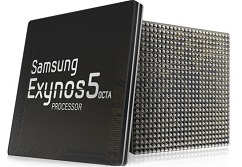LTE, 64-bit and multi-core products are set to boost the smartphone applications processor market to break through the €21.8 billion mark by 2018 although growth will be slowed by switch to new software, analysts have claimed.
The standalone applications processor market is set to fall from a 38 percent market share in 2012 to 28 percent by 2018, according to a new report from Strategy Analytics, thanks to increased activity from integrated players such as Qualcomm, MediaTek, Spreadtrum, Broadcom and Marvell.
[Read more: Qualcomm unveils new CEO and new 64-bit 4G LTE chipset]
The dominance of ARM-based chipsets could be over, with its market share predicted to fall from almost 100 percent in 2012 to 83 percent by 2018. Researchers said this was due to Intel increasingly flexing its muscles in the area, with its work in the 14nm and beyond process spaces. The vendor could also receive a boost from its integrated 3G/4G products in the short term, the researchers added.
[Read more: Intel hits back at Qualcomm by introducing two new chipsets, unveils LTE modems]
Sravan Kundojjala, Senior Analyst at Strategy Analytics, commented: “Strategy Analytics forecasts that the 64-bit chip penetration in smartphone applications processors will rise from three percent in 2013 to approximately 75 percent in 2018. Apple, Intel, Qualcomm and Samsung among others will drive this growth.”
[Read more: Samsung unwraps two new Exynos processors]
The research firm forecasts that 64-bit chip adoption will be somewhat slower than multi-core chip adoption in smartphones as the required software ecosystem transition is likely to take time.
[Read more: Qualcomm announces “world’s first” 64 bit quad-core and octa-core chips]
Meanwhile, it predicts that the size of the tablet apps processor market will increase more sharply between last year and 2018, although it will continue to be dwarfed by the smartphone sector.
Market revenue is expected to hit €5.2 billion by 2018, with the penetration of integrated baseband app processors leaping from two percent in 2012 to 17 percent in 2018. Multi-core penetration will continue to stay around the 90 percent mark it was at last year.
Kundojjala commented: “The barrier to entry is quite low in tablet applications processors compared to smartphone applications processors. Therefore, we forecast a modest average selling price (ASP) growth through 2018, despite the introduction of 64-bit chips. In addition, a high concentration of low-cost tablet chip vendors in this market will result in a price war which is expected to have a significant impact on ASPs.”
Stuart Robinson, Director of Strategy Analytics Handset Component Technologies service, added: “Strategy Analytics forecasts x86-based chip penetration in tablets will increase to 30 percent in 2018 from 2 percent in 2012. We expect Intel’s investments in Android solutions will result in future share gains.”
Read more



